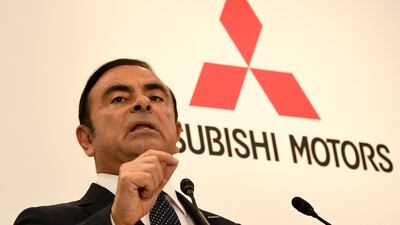Japan's Mitsubishi Motors followed Nissan's lead and dismissed chairman Carlos Ghosn from his position as chairman, appointing the company's chief executive Osamu Masuko in a dual role following allegations of financial misconduct by the unseated executive.
On Monday Mitsubishi's eight-member board met at the automaker's Tokyo headquarters and unanimously voted to dismiss Mr Ghosn, Mr Masuko said in a televised press conference in Tokyo. The Japanese company's shares were up 3.26 per cent in Tokyo at the market's close.
Keeping Mr Ghosn in his role as chairman would be a reputational risk for the company, Mr Masuko said. Mitsubishi, the smallest and most recent member of an alliance between Renault and Nissan, was rescued in 2016 by Mr Ghosn, after it was embroiled in a scandal regarding falsified fuel-efficiency data. Nissan, which owns 34 per cent of Mitsubishi, removed Mr Ghosn as its chairman on November 22 after the industry titan's arrest. Renault has refrained from removing him as chairman and named its chief operating officer as an interim executive.
_______________
Read more:
Quicktake: Fate of Nissan-Renault alliance hangs in the balance after Ghosn arrest
Ghosn must not be a victim of trial by popular opinion
_______________
Japanese and French ministers and car company executives publicly rallied behind the three-way alliance following the 64-year old executive's arrest on allegations of understating his income and misusing Nissan assets. Mr Ghosn has denied any wrongdoing, Japanese public broadcaster NHK reported.
Mr Ghosn's arrest and ouster has set the stage for a looming power struggle between Nissan and Renault over control of the world's biggest car alliance. Nissan is said to be unhappy with what it perceives as its junior partner status, according to Japanese media reports.
The Brazilian-French executive of Lebanese descent had been planning a deeper tie-up between the companies prior to his arrest. One possibility was a merger between Nissan and Renault, which was encouraged by the French government but met with pushback at the Japanese firm.
"There is clearly an incentive for Nissan to try and regain power in the alliance so that it is more proportionate to its size," Demian Flowers, head of automotive at Commerzbank, told The National. "The removal of Ghosn is beneficial to that process but doesn't get Nissan all the way there. In order to succeed, Renault needs to agree to reduce its own standing within the alliance."
The standoff between the companies could persist as the French and Japanese companies seek to protect their interests.
"Renault isn’t massively incentivised to reduce the size of its Nissan stake, even though doing so would free up cash and probably be beneficial to the Renault share price," Mr Flowers said. "Renault management have broader strategic considerations than simply their own share price. And the French government is a strategic, rather than a financial investor. So you are left with a kind of stalemate situation, which I suspect could drag on for a while."
Renault owns 43.4 per cent of Nissan, while Nissan has only a 15-percent non-voting share in Renault. Nissan is 60 per cent bigger than the French carmaker in terms of sales. The relationship is further complicated by the role of the French government, which holds 15 per cent of Renault and has double-voting rights.


